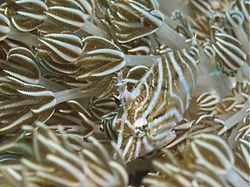| Acreichthys radiatus | |
|---|---|
 | |
| Scientific classification | |
| Kingdom: | Animalia |
| Phylum: | Chordata |
| Class: | Actinopterygii |
| Order: | Tetraodontiformes |
| Family: | Monacanthidae |
| Genus: | Acreichthys |
| Species: | A. radiatus |
| Binomial name | |
| Acreichthys radiatus (Popta, 1900) | |
Acreichthys radiatus, commonly known as the radial filefish or the radial leatherjacket, is a species of demersal marine fish which belongs to the family Monacanthidae widespread throughout the tropical waters of the western Pacific Ocean, including the Ryukyu Islands, the Philippines, the oriental part of Indonesia, Papua New Guinea, the north east area of Australia, and New Caledonia. It is a small size fish that can reach a maximum size of 7 centimeters (2.7 inches) in length. [2]
